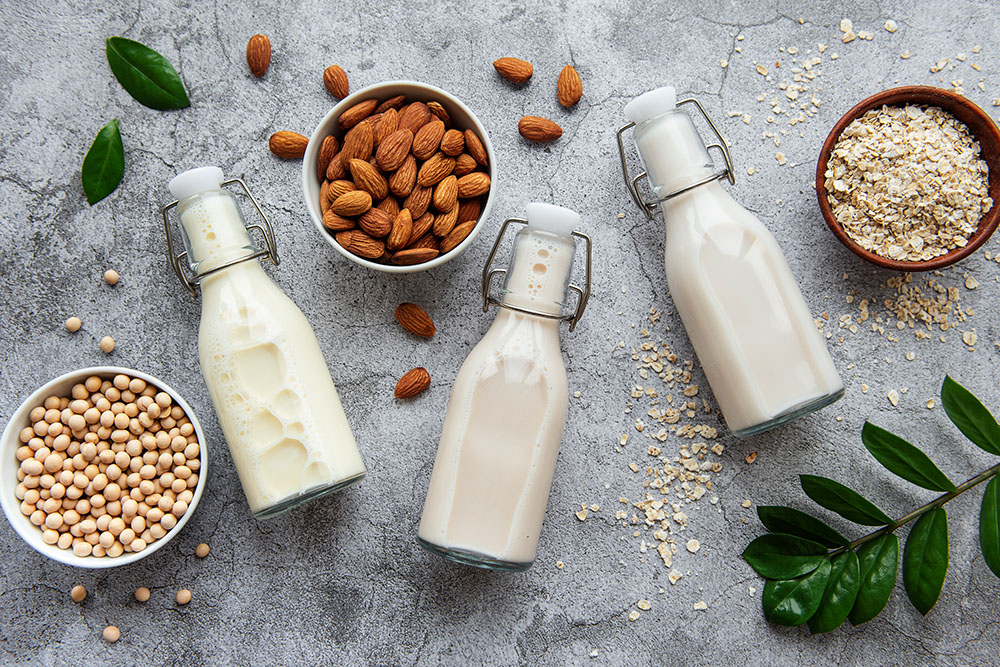Have you ever wondered about the different types of vegan milk and how they compare to traditional cow’s milk? You’re not alone! As more and more people shift towards plant-based diets, the world of vegan milk alternatives has expanded significantly. In this article, we’ll dive into this dairy-free realm and explore various plant-based milk options, as well as discussing their nutritional benefits.
Vegan milk can be sourced from a wide variety of plants, such as soy, almond, oat, rice, coconut, and even potato. Each type of plant-based milk has its own unique set of properties, and many offer a variety of health benefits, such as being low in cholesterol and packed with nutrients. For instance, Ripple, a brand of pea milk, has more protein than soy milk and 50 percent more calcium than cow’s milk.
Table of Contents
What is Vegan Milk?

So you’re curious about vegan milk? Glad you stopped by! Vegan milk, also known as plant-based milk or dairy-free milk, is a fantastic alternative to traditional dairy milk, and it’s perfect for those who follow a vegan lifestyle or have dietary restrictions. These non-dairy milks are made by blending plant-based ingredients with water and then separating the solids to create a smooth, creamy liquid.
Not only do these milk alternatives cater to your taste buds, but they also offer a wide range of options. Love a little nuttiness in your milk? Almond and cashew milk may be your best bet. Prefer a more neutral flavor profile? Soy, oat, and rice milk might tickle your fancy.
Now you may be wondering which plants can be used to make vegan milk? Well, there’s quite an assortment! From nuts like almonds and cashews to grains such as oats and rice, even seeds like hemp and chia can be used to create delicious non-dairy milks. Add exciting tropical flavors with coconut milk or even try pea-based milk for a unique twist.
Nutritional Profile of Vegan Milk
Protein Content
Wondering about the protein content in vegan milk? You’ll find that different plant-based milk varieties offer varying amounts of protein. For example, pea milk has about 8 grams of protein per cup, which is comparable to cow’s milk and soy milk. Other vegan milk options, like rice milk, provide only about 1 gram of protein per cup. So, make sure to check labels and choose a vegan milk with sufficient protein to meet your requirements.
Vitamin and Mineral Content
Are vegan milks rich in vitamins and minerals? Absolutely! Plant-based milks are often fortified with essential nutrients such as calcium, vitamin D, vitamin B12, iron, potassium, iodine, and selenium. Do keep in mind, though, that different vegan milks may have varying levels of these nutrients. For instance, pea milk has a potassium content similar to cow’s milk, making it a great option if you want to maintain your potassium intake while switching to vegan milk.
Sugar Presence
Worried about sugar content when choosing vegan milk? Vegan milks can have different sugar levels depending on the type and whether they are sweetened or unsweetened. For example, rice milk has around 10 grams of sugar per cup, while pea milk boasts only 70 calories and minimal sugar content. To maintain a balanced diet, look for unsweetened plant-based milk varieties, and you won’t have to be concerned about sugar intake. Guzzle down your healthy, eco-friendly vegan milk without any guilt!
Comparison of Various Vegan Milks

Almond Milk
Did you know almond milk is one of the most popular vegan milk options? It’s light, nutty flavor makes it great for coffee, cereal, and even baking. Brands like Almond Breeze offer both sweetened and unsweetened versions. However, be mindful of the water usage during almond production.
Coconut Milk
Love the tropical taste of coconuts? Then coconut milk might be your go-to vegan milk. Its rich, creamy texture is perfect for savory dishes like curries and soups. Just remember, it’s notably higher in fat compared to other plant-based milks.
Oat Milk
Having a smooth, creamy texture and mild taste, oat milk has gained popularity in recent years. Brands like Oatly offer a delicious milk that pairs well with coffee, tea, and smoothies. Environmentally speaking, oat milk requires less water than nut-based milks.
Soy Milk
Soy milk has been around for quite some time and is known for its high protein content. It’s versatile enough for both sweet and savory dishes. Try soya milk in a variety of flavors – chocolate might become your favorite!
Rice Milk
Rice milk is a great option for those looking for a hypoallergenic milk alternative. It has a naturally sweet taste, making it perfect for desserts. Keep in mind, it’s relatively low in protein and higher in carbohydrates compared to other vegan milks.
Hemp Milk
Obtained from hemp seeds, this earthy-tasting milk is a powerhouse of omega-3 and omega-6 fatty acids. With its distinct flavor, hemp milk might take some getting used to, but it’ll be worth it for the nutritional benefits!
Cashew Milk
Cashew milk is known for its incredibly creamy texture and subtle taste, making it a fantastic option for making plant-based cheese and creamy sauces. Cashews, like almonds, require a fair amount of water for production, so factor that into your choice.
Pea Milk
Pea milk, made from yellow peas, is becoming a popular choice due to its high protein content and lower environmental impact. Give it a try! You might be surprised how creamy and delicious it can be.
Hazelnut Milk
The rich, nutty flavor of hazelnut milk makes it an indulgent treat, particularly when paired with coffee or hot cocoa. Hazelnut milk also works well in dessert recipes, providing a delicious nutty twist.
Flax Milk
Flax milk, sourced from flaxseeds, is packed with omega-3 fatty acids and is a great choice for those with nut allergies. Its subtle flavor profile makes it versatile for both sweet and savory recipes.
Macadamia Milk
Macadamia milk, with its smooth, velvety texture and buttery taste, is an excellent option for coffee lovers. It froths well and blends seamlessly with the flavors of your favorite brew. Give it a try next time you make a latte or cappuccino!
Health Implications of Vegan Milk
For Lactose-Intolerant Individuals
Have you ever faced digestive problems after drinking dairy milk? You might be lactose intolerant! Plant-based milk alternatives like almond, soy, or oat milk can be a game changer for you. They are naturally lactose-free, which means they won’t cause those uncomfortable side effects. Not only do they make your tummy happy, but they also provide essential nutrients without the extra baggage of cholesterol.
Risk of Heart Disease and Diabetes
Worried about your heart health? Guess what—vegan milk shines here too! Most plant-based milks have lower fat and calorie content than dairy milk. Soy milk, for example, is rich in heart-healthy unsaturated fats, which can help lower your risk of heart disease. Additionally, studies have shown that a plant-based diet, including vegan milk, might help reduce the risk of type 2 diabetes. Now that’s something to toast with a glass of almond milk!
Potential Impact on Babies
When it comes to your little ones, their health and development are always on your mind. Many pediatricians recommend introducing plant-based milks to children after their first birthday, alongside a balanced diet. However, it’s important to talk to your doctor before making significant changes to your baby’s diet. Keep in mind that while vegan milk offers plenty of benefits, it might not be a complete substitute for the nutrients found in breastmilk or infant formula.
Cancer Prevention Aspects
You’ve probably heard the buzz about how plant-based diets can help prevent cancer. But did you know that vegan milk might play a role too? Isoflavones, found in soy milk, have been linked to cancer prevention due to their antioxidant properties. And the best part? Numerous plant-based milks are rich in essential vitamins and minerals that support your overall health, giving you another incentive to make the switch. So, go ahead—enjoy your vegan milk latte and feel good knowing you’re making a positive choice for your body!
Environmental Impact of Vegan Milk
Greenhouse Gas Emissions
When exploring the environmental impact of vegan milk, it’s important to consider greenhouse gas emissions. You might be aware that the dairy industry contributes to greenhouse gas emissions through methane released by cows and carbon dioxide from the production process. In contrast, plant-based milks, such as soy, almond, and oat milk, produce significantly lower levels of greenhouse gas emissions1.
For instance, producing a portion of soy milk only releases about 30% of the emissions compared to that of dairy milk2. By choosing vegan milk, you’re making a choice that’s not only cruelty-free but also more sustainable.
Water Usage
Another essential factor to examine is water usage. The water required for producing dairy milk is much higher compared to plant-based alternatives. Producing a daily glass of dairy milk for a year requires around 7,000 sq ft of land and over 10 times more water than the same amount of oat milk1.
Soy and legume-based milks are known to be more water-efficient compared to almond and dairy milk3. Choosing vegan milk options like soy milk can significantly reduce your water footprint, making your diet more environmentally friendly.
In a nutshell, opting for vegan milk in your daily consumption benefits the environment by reducing greenhouse gas emissions and conserving water resources. The choice you make contributes to a more sustainable and eco-friendly world.
Conclusion
So, you’re interested in vegan milk! As you might already know, there are many plant-based milk alternatives available in the market. Each one has its own unique flavor and nutritional value, catering to different tastes and preferences. Some popular options include almond milk, soy milk, oat milk, rice milk, and coconut milk, among others.
Why choose vegan milk over traditional dairy milk? There are several reasons why people make the switch. It could be due to lactose intolerance, dairy allergies, or simply embracing a vegan lifestyle. Each of these options offers a distinct taste profile and it’s a great idea to give them a try to see which one suits you best.
When it comes to calories and nutritional content, vegan milks vary. For instance, unsweetened coconut milk contains around 46 calories per cup, while rice milk has about 120 calories and a thinner texture. Keep in mind the different nutritional profiles if you’re considering vegan milk for dietary reasons.




